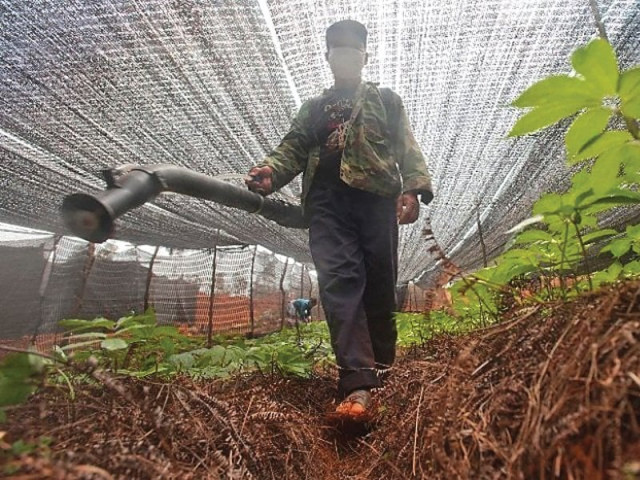Farmers go for tunnel technology to improve productivity
This method allows off-season crop production, gives handsome return.

Low tunnels are less expensive compared to high tunnels and cost Rs30,000 per acre. PHOTO: FILE
“In Pakistan, lack of cold storages, high cost of production and outdated agriculture infrastructure have slashed profit margins of the farmers over the years. Now, with the help of tunnel farming, they are getting handsome returns by growing off-season crops in a controlled atmosphere,” an expert told The Express Tribune.
In tunnel farms, growers can have more plantations per acre by using hybrid seeds, pesticides, balanced fertilisers and irrigation. As a result, plants receive a smooth flow of nutrients and produce a good-quality product.
This new farming method has reduced the need for Indian vegetables as it provides off-season vegetables to the consumers, which were earlier imported from India.
“Cucumber, cauliflower, strawberry, cabbage, melon and watermelon are the major fruits and vegetables produced through tunnel farming to cater to the demand during all four seasons,” said Asif Ali Warraich, a tunnel farmer.
Tunnel technology had cleared the way for bringing radical changes to the agriculture sector, enabling the growers to plant off-season crops and improve their economic condition, he added. “With traditional methods, we had not been able to even meet the production cost,” he claimed.
Elaborating, Warraich said three types of tunnel farming – low tunnels, walk-in tunnels and high tunnels – were going on in Pakistan, adding the farmers installed the tunnel infrastructure according to their financial capacity.
Low tunnels are less expensive compared to high tunnels and cost Rs30,000 per acre. Soil preparation, spraying and picking is difficult in this type of tunnel. Mostly, small farmers opt for low tunnels.
Walk-in tunnels give a better yield compared to low tunnels, but have a higher infrastructure cost of Rs120,000 per acre.
High tunnels give maximum yield and make soil preparation, spraying and picking easier because of their width and height. They cost Rs600,000 per acre for installing the infrastructure. Mostly, big land owners invest in such tunnels.
Farmers say they are happy with the production of off-season vegetables and the good return on investment. They have set up the tunnels without seeking financial support from the government.
Agriculture is the mainstay of Pakistan’s economy that contributes 21% to the gross domestic product. If the government offers incentives to the farmers, the potential of agriculture sector could be much higher.
Published in The Express Tribune, February 13th, 2014.
Like Business on Facebook, follow @TribuneBiz on Twitter to stay informed and join in the conversation.



















COMMENTS
Comments are moderated and generally will be posted if they are on-topic and not abusive.
For more information, please see our Comments FAQ